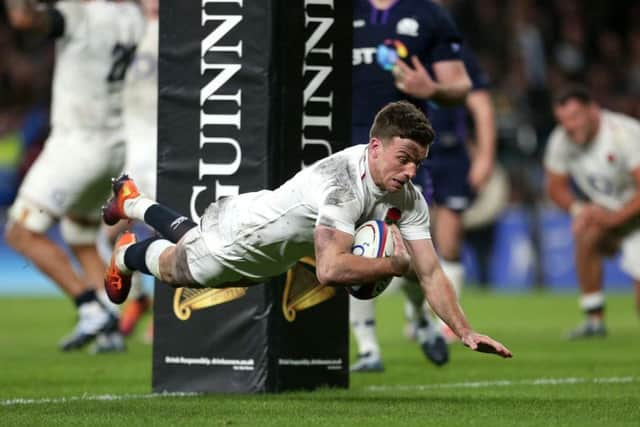WATCH - Scotland storm back to expose mental frailties in Eddie Jones’ England
and live on Freeview channel 276
An hour after an incredible Six Nations contest had ended at Twickenham on Saturday night, England’s Ben Youngs, newly-crowned as his country’s most capped scrum-half, was still shaking his head utterly bemused.
“We are looking at ourselves in the mirror going, ‘what have we done?’” he offered.
Advertisement
Hide AdAdvertisement
Hide Ad“You can’t be that ruthless in the first half and then so toothless in the second.
“That is ultimately what we were; we thought the job was done and it was far from done. We were too loose, too flippant with the ball. Disappointing.”
Most people thought this final game would lack any sort of intrigue given, as England captain Owen Farrell prepared to walk out of the tunnel, Wales were lifting the Six Nations trophy 145 miles away in Cardiff and celebrating a Grand Slam.
Their destruction of Ireland had ended any hopes of the Red Rose snatching the Championship on the last day and, so, there was an air of futility about the 80 minutes ahead in south west London.
Yet how wrong could those people have been?


Advertisement
Hide AdAdvertisement
Hide AdGranted, as England raced into a 31-0 lead inside just 29 minutes it looked like a gargantuan mis-match, and quiet glances were being made towards records to check their biggest win over Scotland.
It was a record of a completely different kind being researched soon after, though – the size of the greatest comeback in Test match history.
In the end, perhaps disappointingly, neither came to pass; brilliant Scotland, ignoring their vast injury list and odds of 10-1 for a first victory at Twickenham since 1983, did produce a simply glorious passage of play to score six successive tries.
This earned them a hugely improbable 38-31 lead into stoppage-time.


Advertisement
Hide AdAdvertisement
Hide AdHowever, with the final play, as the desperate, embarrassed hosts battered away trying to retrieve the situation, exhausted Scotland splintered.
Jubilant England replacement George Ford – on his 26th birthday – finally weaved over between the posts to hand himself a simple conversion to level a quite breathless encounter.
Ford had come on, unusually, for Farrell, the totemic fly-half who is usually so unflappable but, on Saturday, resembled a chicken noticing the coop door ajar as a fox approached.
His charged-down kick at the end of the first half saw Scotland hooker Stuart McNally then beat him in a 55m race to the line as the visitors’ fightback began.
Advertisement
Hide AdAdvertisement
Hide AdFarrell also threw an intercept pass for Finn Russell to score their fifth try – and fourth in 13 crazy minutes – to level things at 31-31 on the hour.
Moreover, the British Lion then shoulder charged two-try winger Darcy Graham to gift Greg Laidlaw a glorious chance to put Scotland ahead.
Yes, the Scotland replacement was off-target, but it was understandable why head coach Eddie Jones hauled off Farrell; he was imploding. Remarkably, Sam Johnson did put Gregor Townsend’s side ahead in the 76th minute, fly-half Finn continuing his stunning display by unleashing the centre in midfield, who then made a mockery of England’s so-called defence.
England – who had dazzled earlier with tries from Jack Nowell, Tom Curry, Joe Launchbury and Jonny May, the stylish Henry Slade mesmerising – did survive, but in their final competitive game before the World Cup in Japan their mental fragility was alarming.
Advertisement
Hide AdAdvertisement
Hide Ad“What most teams probably think now is that we can do all the fancy stuff, but when it comes down to it and the real questions are asked can we stay in the fight?” admitted No 8 Billy Vunipola, England’s sole defeat being amid pressure in Cardiff.
“That hurts more than anything. We had a similar situation at Saracens a few years ago and you’ve got to go through this hurt to learn, when you’re in those situations, how to fight through it.”
The question is have England got enough time to sort the issue before that World Cup this autumn? It was disconcerting watching them crumble so easily from such a position of power.
Clearly, on the earlier subject of foxes, Russell’s ingenuity and cunning was wonderful to watch, but how was he allowed so much time and space to dictate as he did? And where was the defence when Ali Price chipped through for Magnus Bradbury’s score?
Advertisement
Hide AdAdvertisement
Hide AdRussell’s daring looped pass broke them again for Darcy’s second and it was all so easy.
Scotland retained the Calcutta Cup and, in doing so, left huge question marks about England’s ability to win the big one.
England: Daly; Nowell, Slade, Tuilagi (Te’o 77), May; Farrell (Ford 70), Youngs (Spencer 74); Moon (Genge 5), George (Cowan-Dickie 74), Sinckler (Cole 51), Launchbury (Hughes 74), Kruis, Wilson (Shields 62), Curry. Vunipola.
Scotland: Maitland (Hastings 68): Graham, Grigg (Harris 57), Johnson, McGuigan; Russell, Price (Laidlaw 57); Dell (Reid 45), McInally (Brown 57), Nel (Berghan 61), Toolis, Gilchrist (Gray 57), Skinner (Strauss 57), Watson, Bradbury.